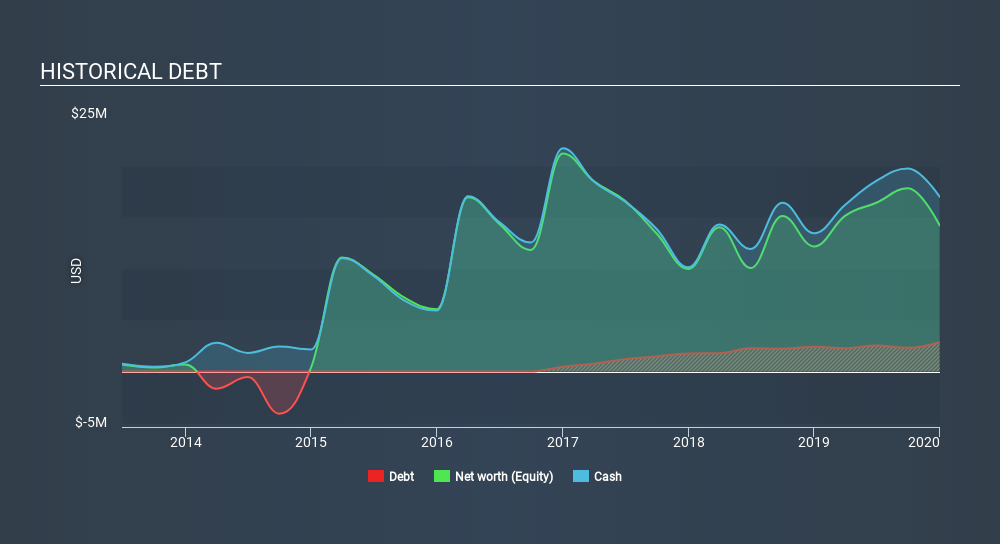Is VolitionRx (NYSEMKT:VNRX) Using Too Much Debt?

The external fund manager backed by Berkshire Hathaway's Charlie Munger, Li Lu, makes no bones about it when he says 'The biggest investment risk is not the volatility of prices, but whether you will suffer a permanent loss of capital. So it seems the smart money knows that debt - which is usually involved in bankruptcies - is a very important factor, when you assess how risky a company is. We note that VolitionRx Limited (NYSEMKT:VNRX) does have debt on its balance sheet. But the real question is whether this debt is making the company risky.
When Is Debt A Problem?
Debt and other liabilities become risky for a business when it cannot easily fulfill those obligations, either with free cash flow or by raising capital at an attractive price. Part and parcel of capitalism is the process of 'creative destruction' where failed businesses are mercilessly liquidated by their bankers. While that is not too common, we often do see indebted companies permanently diluting shareholders because lenders force them to raise capital at a distressed price. Of course, debt can be an important tool in businesses, particularly capital heavy businesses. The first step when considering a company's debt levels is to consider its cash and debt together.
Check out our latest analysis for VolitionRx
How Much Debt Does VolitionRx Carry?
You can click the graphic below for the historical numbers, but it shows that as of December 2019 VolitionRx had US$2.84m of debt, an increase on US$2.40m, over one year. But on the other hand it also has US$17.0m in cash, leading to a US$14.1m net cash position.
How Strong Is VolitionRx's Balance Sheet?
We can see from the most recent balance sheet that VolitionRx had liabilities of US$3.86m falling due within a year, and liabilities of US$3.23m due beyond that. On the other hand, it had cash of US$17.0m and US$16.0k worth of receivables due within a year. So it actually has US$9.89m more liquid assets than total liabilities.
This surplus suggests that VolitionRx has a conservative balance sheet, and could probably eliminate its debt without much difficulty. Simply put, the fact that VolitionRx has more cash than debt is arguably a good indication that it can manage its debt safely. The balance sheet is clearly the area to focus on when you are analysing debt. But it is future earnings, more than anything, that will determine VolitionRx's ability to maintain a healthy balance sheet going forward. So if you're focused on the future you can check out this free report showing analyst profit forecasts.
Given its lack of meaningful operating revenue, VolitionRx shareholders no doubt hope it can fund itself until it can sell some of its new medical technology.
So How Risky Is VolitionRx?
Statistically speaking companies that lose money are riskier than those that make money. And in the last year VolitionRx had negative earnings before interest and tax (EBIT), truth be told. And over the same period it saw negative free cash outflow of US$13m and booked a US$16m accounting loss. However, it has net cash of US$14.1m, so it has a bit of time before it will need more capital. VolitionRx's revenue growth shone bright over the last year, so it may well be in a position to turn a profit in due course. Pre-profit companies are often risky, but they can also offer great rewards. The balance sheet is clearly the area to focus on when you are analysing debt. However, not all investment risk resides within the balance sheet - far from it. Case in point: We've spotted 3 warning signs for VolitionRx you should be aware of, and 1 of them is significant.
When all is said and done, sometimes its easier to focus on companies that don't even need debt. Readers can access a list of growth stocks with zero net debt 100% free, right now.
If you spot an error that warrants correction, please contact the editor at editorial-team@simplywallst.com. This article by Simply Wall St is general in nature. It does not constitute a recommendation to buy or sell any stock, and does not take account of your objectives, or your financial situation. Simply Wall St has no position in the stocks mentioned.
We aim to bring you long-term focused research analysis driven by fundamental data. Note that our analysis may not factor in the latest price-sensitive company announcements or qualitative material. Thank you for reading.

